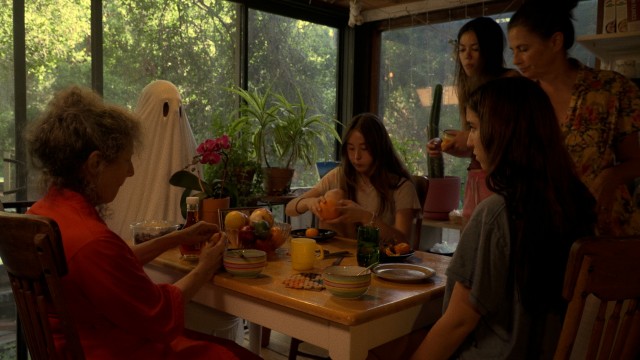Chloe Xtina’s Ghost of You is a sensitive and poetic piece that strikes close to home for me, emotionally and literally, as a young woman watching a teenage girl living her normal (shouldn’t be normal) life in our shared hyper-sexualized reality. As much of the film’s beauty rests in its form, it plays with motion – bodies and nature, camera movements, shifting aspect ratios – to create a visual tapestry that mesmerizes with its fluidity and depth.
With its subject matter being subjective yet shared, Xtina makes us understand her intentions by allowing us to experience the emotions of her short through a dynamic and realist approach, instead of preaching at us. Her inspiration, rooted in her own encounters with hyper-sexualization in her youth, sheds light on her journey and how she learned to navigate the world. As she explains:
“I became haunted by the intrusive thought that a man was watching me at all times. I was consumed by masochistic desire as a coping mechanism — to feel more in control of what I couldn’t. The story of Ghost of You is about craving autonomy and controlling desire as a teenage girl. I know this internalized male gaze is common but it’s not something I had seen personified in film before.”
The feeling of being watched, while simultaneously wanting to be seen and the experience of missing someone are just some of the complex themes explored in Ghost of You. Trying to reduce or remedy any of these to a singular emotion would be a disservice to women everywhere, and their varied and nuanced experiences with being sexualized.
Xtina makes room for the many possible feelings through sensory stimulations that are largely ambiguous. The narrative threads are solid, but for example, I am wowed by how I can feel the grass Mae and her friends lay in and I loved to linger in the amount of time the director gave to pleasure and play in her narrative. These moments are contrasted, however, by the jolting experience when they are disturbed. I am there present with them, but I am also keenly aware of this pervasive uniform experience of growing up female presenting.
These contrasting emotions are portrayed skillfully through the shifts in aspect ratio/perspective throughout the film. For me, these changes in screen size communicate closeness in a very authentic way, even though they draw attention to the craft of film. There’s just something in the change of stimuli that draws us in, this clash between semi-polished nowness and feelings of nostalgia are what I love in the filmmaking of Xtina. There’s also a notable nostalgic vibe in the sound editing in how it is semi-unclear; it resonates like audio processing in memory.

“There was a lot of devised collaboration and improv that went into the world building of our film” – Xtina discusses the production of Ghost of You.
Shot by DP Michelle Jihyon Kim, Ghost of You employs a looming handheld camera that finds autonomy in not following specific action in formulaic or expected ways. The camera roams freely, indifferent to the events unfolding, yet it has a strong presence to Xtina’s goal of striving to show how girls bear this feeling of being watched.
Revealing that they mainly shot “digitally on a Canon to create a grounded sense of the world”, there are moments in the short where Xtina opts to switch to a Sony handycam, to highlight “a blurry and intrusive gaze”. Explaining that the aim of the photography was to create this constant feeling that “something is or could be watching Mae”, the director used this approach to “draw attention to the fact that the audience is providing that gaze.” It creates a really powerful viewing experience, as by doing this, the camera becomes a character in Ghost of You and, in part, the audience feels less like a viewer and more attached to the action on screen.
We are excited to see more of how Chloe Xtina manipulates film form to tell stories that are needed to be told and make us feel things that shouldn’t be tucked under wraps. Currently the filmmaker is in production of another short, which is shot on 16mm and called Arcadia. It will explore similar themes to Ghost of You.
